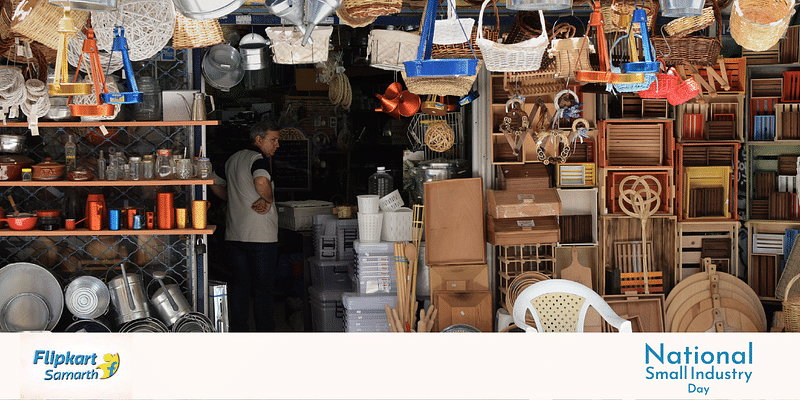
At the heart of India’s economic progression, small-scale industries stand as beacons of vitality, embodying the spirit of “vocal for local” growth and opportunity. These enterprises, often rooted in the heart of local communities, wield a power that transcends their modest size. Their contributions resonate deeply, sparking economic diversity and breathing life into neighbourhoods through the creation of job opportunities.
As the Indian entrepreneurial spirit continues to weave tales of innovation and perseverance, a special day puts the spotlight on the unsung heroes of this narrative – National Small Industry Day. This day showcases the role small-scale industries play in the growth, diversity, and employment landscape of our nation.
As we delve into the narrative of these industrious underdogs, we also uncover a potent ally in their journey — Flipkart Samarth, an instrumental force that has ignited transformative journeys for many.
More than a mere ecommerce platform, Flipkart’s initiative Samarth has emerged as a transformative movement that empowers Indian small-scale sellers. Beyond transactions, Flipkart Samarth offers sellers not just a marketplace, but also an ecosystem of skill refinement, digital enlightenment, and entrepreneurial nurturing that aligns perfectly with the ‘Make in India’ vision.
Transcending traditions, embracing change
Established in 1985, Meghdoot Herbal stood as a trusted herbal brand in Lucknow. Founded with a modest Rs 50,000 loan from Khadi Gramodyog by their grandfather, Vipul and Vishwas Shukla carried forward the legacy of Meghdoot Herbal. For generations, their handmade herbal products not only sustained their family but also acted as a lifeline for the entire village. What distinguished this small-scale business was its close-knit rural workforce, with most employees living within a 10-km radius.
The Shukla brothers had nurtured their venture, registering it with the UP Khadi and Village Industries Board (UPKVIB). With commendable offline sales in Uttar Pradesh and Madhya Pradesh, Meghdoot Herbal was a well-established local brand. Yet, in January 2020, Vipul recognised the winds of change brought by the pandemic and rose to the occasion.
He introduced sanitisers to address the prevailing need and, overcoming reservations, partnered with Flipkart Samarth to venture into ecommerce. Meghdoot Herbal’s transition was further smoothed by an MoU between Flipkart and UPKVIB, opening an ecommerce avenue for village industries. Admitting a delayed start, Vipul and his team quickly adapted, with sales soaring. Central to their success were Flipkart’s account managers who guided their ecommerce journey, leading to impressive growth.
Vipul Shukla’s journey caught the eye of Dr Navneet Sehgal, IAS, who recognised his rapid ascent within the Flipkart Samarth programme. Once confined to a regional market, Meghdoot Herbal’s products are now available in Karnataka, Maharashtra, and even Kashmir.
Vipul’s optimism encapsulates their transformation, “Jo hoga accha hoga (It will all be good).” With a manifold increase in turnover, Meghdoot Herbal’s narrative signifies the potential of collaborative initiatives like Flipkart Samarth to reshape the trajectories of small-scale industries, nurturing their resilience and growth.
Crafting success with digital transformation
Growing up in Delhi, Mehar Batra was a firsthand witness to the evolution of his family’s business, Pyramid Fashion. A venture initiated by his grandfather over 25 years ago, specialising in women’s wear for exports, Pyramid Fashion underwent a remarkable transformation – from a modest room with a handful of staff and machinery to a sprawling manufacturing enterprise with multiple showrooms.
Fuelled by an innate entrepreneurial spirit, Mehar joined Pyramid Fashions at the age of 27, bringing in fresh vigour and a vision to reshape the family legacy. His foremost objective was to broaden Pyramid Fashion’s footprint in the digital marketplace.
Inspired by the offline expansion of Pyramid Fashion, Mehar recognised the immense potential of online sales. In Mehar’s eyes, Flipkart’s customer-centric approach and commitment to quality set it apart. Flipkart was the natural choice for customers seeking affordability and easy availability. Aligning with this ethos, Mehar joined Flipkart as a seller towards the end of 2020, although the journey had its share of challenges.
Starting anew on the digital platform, Mehar navigated the learning curve with the guidance of his Flipkart manager. A slow start eventually blossomed into an unexpectedly high influx of orders, surpassing the 100-order mark per day. This growth further amplified during flagship events, with sales almost doubling.
In the pursuit of growth, Mehar envisions his brand gaining wider exposure and cementing its presence in the online sphere. Buoyed by Flipkart’s support, he’s confident that this trajectory is within reach, propelling his business into a promising future.
Backed by an in-house manufacturing setup comprising over 200 skilled individuals and an arsenal of 180 machines, Mehar’s confidence in the apparel and garment industry’s potential remains steadfast.
From brick-and-mortar to ecommerce powerhouse
Raju Lunawath‘s entry into his father’s electronics retail business marked the beginning of his hands-on journey. Fuelled by ambition and fresh out of college, he initiated a shift in the product line, incorporating lighting, home appliances, and personal care products. Driven by the aspiration to make it big, his efforts yielded lukewarm results. What followed was seven years of grappling with the brick-and-mortar challenges – from exhausting travels to delayed payments, the constraints of a localised customer base, and limited growth prospects.
However, the tide turned in 2013 when a friend introduced Lunawath to Flipkart. The shift was almost magical. “From a few orders, I suddenly had 50! The realisation hit me – ecommerce was a game-changer,” he reminisces. This revelation prompted a major shift; he transitioned a significant portion of his business from offline to the online realm.
The move wasn’t without skepticism. “Kya kar raha hai, bhai? (What are you doing, man?)” his father questioned. Yet, the shift freed Lunawath from the confines of his father’s Bengaluru shop, extending his reach to the farthest corners of India. The deluge of Flipkart orders, sometimes reaching as high as 200 a day, silenced doubts. “The numbers soared, and in 2014, I closed down my store,” Raju proudly states.
Lunawath’s AmazeStore has since blossomed into one of Flipkart’s major success stories. From a trickle of daily orders to a torrent of over 1,000, and from a one-man operation to a thriving workforce of 80, the digital transition has been revolutionary. “Unlike offline sales with a 90-day payment cycle, here, cash realisation is swift,” he explains.
Lunawath’s journey underscores how a shift from offline to online can unleash boundless potential. Through the prism of his story, the transformational influence of ecommerce on small-scale industries shines brightly, resonating with the essence of National Small Industry Day.
Empowering progress
These chronicles illustrate the metamorphosis of traditional businesses into modern success stories. As we stand at the crossroads of tradition and innovation, the synergy between heritage and progress is palpable. National Small Industry Day encapsulates this sentiment, spotlighting the journey from local to global, from modest beginnings to resounding success. And as we applaud the accomplishments of small-scale businesses, we also affirm the transformative potential that collaboration, empowerment, and the spirit of entrepreneurship hold for India’s economic landscape.




![Read more about the article [Funding alert] Kaagaz, The Renal Project, Zama Organics, others raise early-stage funds](https://blog.digitalsevaa.com/wp-content/uploads/2022/02/V-05-1600852077699-300x150.png)





